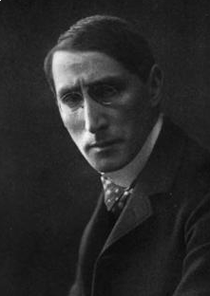Oskar Fried

Oskar Fried (1 August 1871 – 5 July 1941) was a German conductor and composer. He was known as a great admirer of Gustav Mahler, whose works he performed many times throughout his life. Fried was also the first conductor to record a Mahler symphony. He held the distinction of being the first foreign conductor to perform in Russia after the Bolshevik Revolution (1922). He eventually left his homeland in 1933 to work in the Soviet Union after the political rise of Adolf Hitler's Nazi Party, and became a Soviet citizen in 1940.
In 1899, Fried married the amateur poet Augusta (Gusti) Rathgeber (1872–1926) and had two daughters with her, Monika and Emerentia (dates are unknown). From 1892, Gusti Rathgeber had been married to German poet Otto Julius Bierbaum but left him when she and Fried met, and fell in love with each other.
Biography

Born in
The performance in Berlin, and later in Vienna, of his composition Das trunkene Lied ("The Drunken Song") for chorus and orchestra brought Fried his first public successes and led to his appointment in 1904 as the conductor of a Berlin choral society.
Fried first met
In 1922, he went to the
Following a matinee concert on 23 October 1921 (in the Scala Palace in Berlin) Fried made the first recording (acoustic) of any Mahler symphony, the Second, with the
In November 1927, at the invitation of the BBC programme planner and his own former student Edward Clark, he made his British conducting debut, in a program of Delius, Weber, Brahms and Liszt in London.[7]
Driven from Germany by the
Fried’s Compositions
The list of Fried’s compositions comprises the following published scores.
• 3 Lieder, op. 1 for voice and piano (B. Firnberg, Frankfurt)
• Adagio and Scherzo, op. 2 for wind instruments, 2 horns and kettle-drum (Breitkopf & Härtel)
• 4 Lieder, op. 3 for voice and piano (A. Dencke, Berlin)
• 3 Lieder, op. 4 for voice and piano (A. Dencke, Berlin)
• Drei Lieder, op. 5 for voice and piano (Bote & Bock, Berlin 1901)
• [7] Leichte vierhändige Klavierstücke, op. 6 for piano four hands (Bote & Bock, Berlin 1901)
• Sieben Lieder, op. 7 for voice and piano (J. Hainauer, Breslau 1903)
• 3 two-part songs in canon form op. 8 (J. Hainauer, Breslau)
• Verklärte Nacht (Rich. Dehmel), op. 9 for mezzo-soprano, tenor and orchestra (Breitkopf & Härtel)
• Präludium und Doppelfuge, op. 10 for string orchestra (J. Hainauer, Breslau)
• Das trunk’ne Lied (Fr. Nietzsche), op. 11 for soprano, contralto and bass, mix. choir and orchestra (J. Hainauer, Breslau 1904)
• Drei Lieder, op. 12 for four-part female chorus (piano ad. lib.) (J. Hainauer, Breslau 1903)
• Drei Lieder zu alten Wolksweisen, op. 13 for voice and piano (J. Hainauer, Breslau 1904)
• Lied der Mädchen, op. 14 for four-part women’s chorus and violin solo (harp ad. lib.] (J. Hainauer, Breslau 1904)
• Erntelied (Rich. Dehmel), op. 15 for male chorus and orchestra (J. Hainauer, Breslau)
Works without opus numbers and unpublished
• Four orchestral songs (performed 1912).
• Die Auswanderer (Emil Verhaeren/Stefan Zweig), melodrama for voice and orchestra (performed 1913).
References
- ^ a b c de la Grange (1999), p. 243
- ^ a b c d de la Grange (1999), p. 244
- ^
The Encyclopedia Americana: A Library of Universal Knowledge. New York: Encyclopedia Americana C. 1919. pp. 103. OCLC 7308909. Article "Fried, Oskar".
- ^
Lawson, Colin (2002). The Cambridge Companion to the Orchestra. ISBN 0-521-00132-3.
- ^
Pickett, David (2005). "Mahler on Record: the Spirit or the Letter?". In Barham, Jeremy (ed.). Perspectives on Gustav Mahler. Aldershot, Hampshire, England; Burlington, VT: Ashgate. p. 350. ISBN 0-7546-0709-7.
- ^ Oskar Fried: A forgotten Conductor, Music and Arts Programs of America.
- ^ Delius Society Journal, April 1985, Oskar Fried issue
Bibliography
- Peter Cahn: Das Hoch'sche Konservatorium in Frankfurt am Main (1878-1978), Frankfurt am Main: Kramer, 1979.
- ISBN 0-19-315160-X.
- David Ewen, Encyclopedia of Concert Music. New York; Hill and Wang, 1959.
- Alexander Gurdon: Von Mahler bis Moskau. Der Dirigent und Komponist Oskar Fried. Münster 2023.
